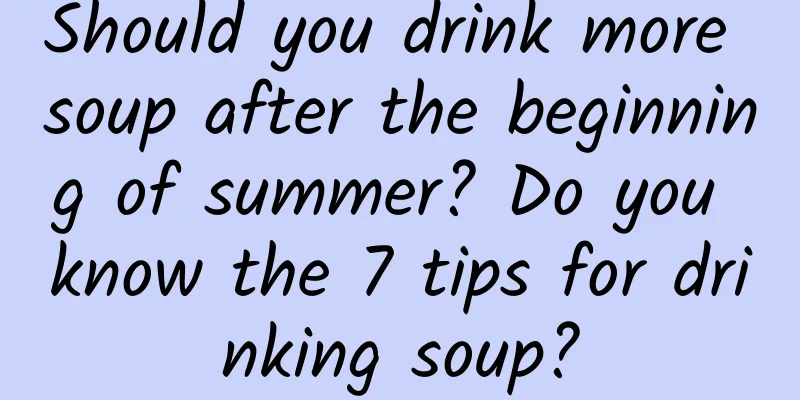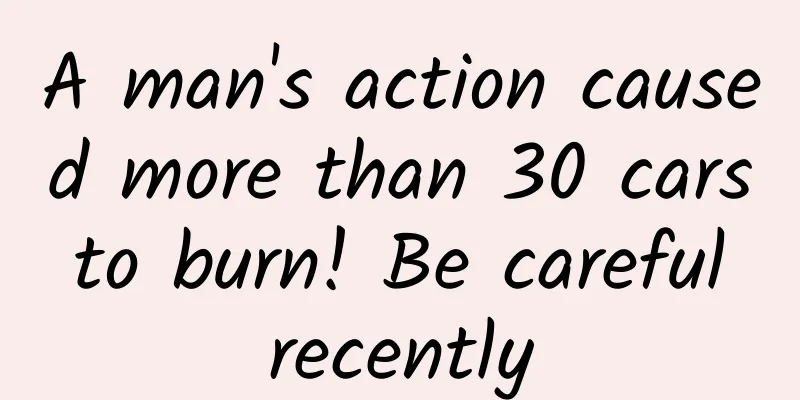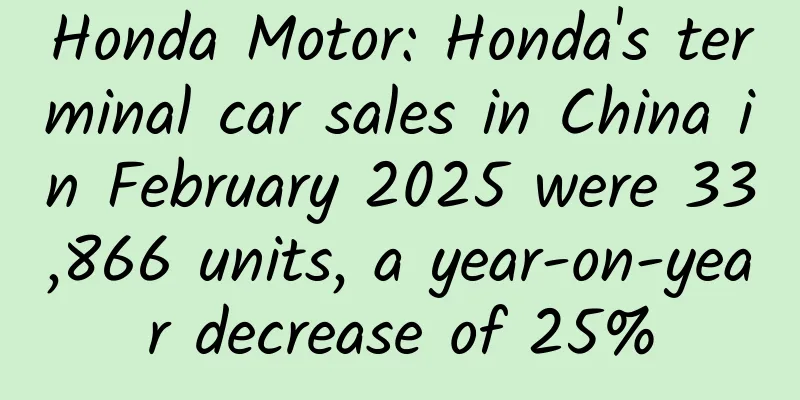Should you drink more soup after the beginning of summer? Do you know the 7 tips for drinking soup?

|
After the Beginning of Summer in early May, the cool spring gradually fades away and the hot summer begins. The media came to interview about summer diet and talked about the topic of drinking soup to stay healthy in summer. my country does have a tradition of drinking soup for health. However, drinking soup does not necessarily promote health. The specific effect depends on what kind of soup it is, how to drink it, and whether it is drunk in the right way. The first knowledge point: Why do you need to drink more soup in summer? As the temperature rises, the amount of sweating increases, from insensible sweating to sensible sweating. The loss of water needs to be supplemented from food and drinks. Fluid supplements include drinking water, tea, other liquid drinks, including porridge, soup, and also increased vegetables and fruits. So, why don't we just drink water, but also drink soups, eat vegetables and fruits? Because water stays in the body for a relatively short time, it is quickly absorbed and excreted . For soups containing solutes, part of the water molecules are bound by the solutes, and the retention time in the body is prolonged; for soups containing starch or soluble dietary fiber, part of the water will be carried to the small intestine and even the large intestine, and the retention time in the body is also relatively long. Part of the water in vegetables and fruits is in the cells that are not fully chewed, and will be slowly released as the vegetables and fruits are digested, so it stays in the body longer. Moreover, sweat in summer is not pure water. It also contains sodium, potassium, calcium, magnesium, B vitamins, and a small amount of protein, amino acids, urea and other nitrogen-containing substances. The solute components in the soup can, to a certain extent, also play a role in replenishing the nutrients lost by sweating. This brings us to the second point of knowledge: What nutrients are in the soup? When making soups, some of the sodium, potassium, magnesium and other elements, water-soluble vitamins and water-soluble antioxidants in the ingredients will dissolve in the soup, supplementing trace nutrients and increasing the intake of health-care ingredients. For example, lean meat is high in potassium because it is a major component of intracellular fluid. Lean meat is also a good source of various B vitamins. Highly soluble potassium also enters the broth when cooking. There are many nitrogen-containing substances in meat, including soluble proteins, free amino acids, umami peptides, and small molecular nitrogen-containing substances such as creatine and inositol, which will all end up in the soup. They can help make up for the nitrogen loss during sweating, and also have a certain appetizing and digestive effect. Therefore, broth without floating oil and not too salty is indeed a nutritious drink. It is also right to give this soup to patients who have weak digestive ability after surgery and cannot eat large pieces of meat temporarily. When the weather is hot, people like to cook some bean soups such as red bean soup and mung bean soup as drinks. In fact, they are getting a lot of polyphenol antioxidants in the bean skin, as well as the rich potassium and B vitamins in the beans. When you cook soup with whole grains such as millet, brown rice, and corn, you can also get similar nutrients. Although using vegetables and fruits to cook soup will result in the loss of some vitamin C, it can retain the potassium, various antioxidant ingredients, and soluble dietary fiber such as pectin. The third knowledge point: How to drink soup to control oil? How to make soup? Some soups contain fat, including chicken soup, meat soup, oily vegetable soup, and various milky soups. It is not difficult to control the fat content of soup. You just need to do three things. First, when cooking vegetable soup or egg soup, you can add no oil or very little oil , and it is best not to stir-fry them. In some places, people like to sauté the scallions and ginger first, stir-fry the vegetables, or stir-fry the eggs, shredded pork, etc., and then add water to make soup. The soup made in this way tastes very fragrant, but it is not the original taste of the vegetables, but the taste of the seasonings stir-fried with oil. For example, if the eggs and tomatoes in the tomato and egg soup are fried with oil and then water is added, then even if it is boiled into soup, the oil consumed is almost the same as tomato scrambled eggs. In contrast, vegetable soup and egg soup cooked directly with water have very little oil. Add a few slices of thinly sliced tomatoes to the boiling water, then beat in the egg liquid and stir, turn off the heat, add half a spoonful of sesame oil, and you can drink it refreshingly. Second , when cooking meat broth or chicken broth, use low heat to cook the soup, and then remove the floating oil after the soup is cooked . As the saying goes, oil and water are incompatible. If no emulsifier is added and the fire is not boiled high to allow fat and protein to form emulsified particles, the fat will always float on the surface, and the clear soup with extremely low fat content will be below. You can use a spoon to skim the oil directly, or you can put it in the refrigerator and let the oil semi-solidify before scraping it out. The separated oil has fragrance and can be used to make stewed dishes. Third, avoid drinking milky soup frequently . Milky soup means emulsification. When the soup is kept boiling, the fat is broken into small droplets, and then the fat is wrapped by emulsifying components such as protein or phospholipids to form emulsified globules, which are evenly dispersed in the water to form milky soup. To make milky soup, a certain amount of fat must be present . For example, milk contains 3% to 4% fat, and soy milk contains 2% to 3% fat. The richer the milky white, the higher the fat content. If you drink a bowl (about 200 grams) of milky white fish soup with a fat content of 2%, you may drink 4 to 5 grams of fat, which is a considerable amount. The fourth knowledge point: How should you drink soup to control salt intake? Compared with the oil that is easily visible to the naked eye, the salt in the soup is more worrying. Although vegetable soup and meat soup contain potassium, the content is far less than the sodium added when salt is added, and sodium-containing ingredients such as MSG in soup. For soup, people usually think that the saltiness is just right, and about 0.5% salt is needed. Strong-flavored soups such as instant noodle soup usually contain about 1% salt. Based on a salt concentration of 0.5%, drinking a small bowl of soup (about 200 grams) will easily consume 1 gram of salt. The dietary guidelines recommend no more than 5 grams of salt a day. As long as you drink a bowl of soup at noon and at night, 2 grams of salt will be consumed... In summer, the human body sweats a little more, so the salt limit can be relaxed. But if you are not a heavy laborer or an athlete who runs 10 kilometers outdoors, and the amount of sweat is not that large, you still cannot drink a lot of too salty soup. Especially for people who already have high blood pressure problems, they should pay more attention - it is rare to sweat a lot in summer, and excreting excess sodium can lower blood pressure a little... Therefore, when making soup, try to use as little salt as possible, just enough to taste a little salty. For chicken soup and meat soup, which are already delicious, a salt content of about 0.2% is enough to taste delicious. If chicken essence is added to vegetable soup, salt can be omitted. Soup with less salt and less oil can better taste the original freshness of the ingredients. The fifth knowledge point: To control blood sugar, you also need to be careful when drinking soup! Be careful about adding sugar to some soups. Sugar may be added to mung bean soup, red bean paste, soy milk, Tremella soup, and corn soup... The sugar you put in soups, just like sweet drinks, is added sugar, which brings extra calories and puts extra burden on the body. Therefore, you need to put as little sugar as possible in soup, or even no sugar at all. If you want sweetness, you can add a few dates, dried longans or a small amount of raisins to increase the sweetness and nutrition. The sixth knowledge point: People who control uric acid can still drink some soups. Patients with gout and hyperuricemia know that they should be careful about purine in chicken soup, fish soup and meat broth. However, vegetable soup and grain soup are low-purine drinks that you don't need to worry about, as long as you try not to add chicken essence, soup essence, soup powder and other seasonings. Because they usually contain sodium salts of nucleotides, which are the source of purine. It is OK to drink bean soup, but the cooking time should be shorter, within 8 minutes, and the soup should be taken before the beans are broken. In this way, the purine inside the beans has not come out, and the potassium and polyphenols dissolved from the bean skin are very low in purine. In addition, people who control uric acid should also pay attention to controlling sugar, so do not add sugar when drinking red bean soup, mung bean soup, etc. The seventh knowledge point: Does it matter when you drink soup? Many people have heard that drinking soup before meals can help you stay slim and healthy. This is because 20 years ago, several studies found that drinking water, soup, and beverages before meals can help reduce your natural food intake during meals. Later, this knowledge point was repeatedly promoted by teacher Hong Zhaoguang and became common knowledge. Other studies have found that only drinking soup before meals is effective in controlling food intake. Drinking soup while eating can increase the feeling of fullness, but it cannot reduce food intake. So, what is the relationship between soup drinking time and blood sugar response? I checked the data a few days ago and found that a study result is as follows: patients with type 2 diabetes who drink 200 ml of warm water during meals or drink warm water half an hour after meals will increase the magnitude of blood sugar response, and drinking water half an hour after meals will significantly stimulate the increase of GIP (Roland et al., 2019). Researchers believe that drinking water after a meal may increase the gastric emptying force again, speed up the speed of chyme entering the small intestine, and thus inhibit the decline of blood sugar levels. Theoretically, hot soup may have a greater effect than plain water. In addition, for people with weak gastrointestinal function, especially those with low gastric motility and gastroptosis, drinking a lot of soup during meals will obviously increase the burden on gastric motility . Therefore, these people can drink soup 30 minutes before meals; or drink more soup 2 hours after meals. Even so, drinking a few sips of appetizer soup should not be a taboo. It seems that the so-called "separation of food and water" may make sense for some patients, but for healthy people, there are not so many concerns. In short, in summer, it is recommended to drink more oil-free and low-salt soups such as whole grain soup, bean soup cooked for a few minutes, and lightly salted vegetable soup. If you do not have a problem with high uric acid, you can also happily enjoy oil-free and low-salt broth, chicken soup, and fish soup. |
>>: If you don’t change these habits, osteoporosis may occur earlier! See if you are affected...
Recommend
10 new media tools that can improve work efficiency by 60%
I coined the term "device merchant" in ...
Don’t do these 4 things to your children during the holidays!
The Spring Festival is here. According to traditi...
How much does it cost to develop a Jixi Rubber and Plastic Mini Program?
What is the investment cost of Jixi Rubber and Pl...
How to deal with general violations in Taobao Live? Will I be demoted?
This article mainly introduces how to deal with g...
"Healthy through eating" series | Where are nitrites hidden? Eating this way can reduce your intake
In recent years, the media has repeatedly reporte...
Ma Da Ge amateur internet celebrity incubation course
Introduction to the resources of Ma Da Ge amateur...
[Aoyama Yuki] Japanese JK uniform youth girl campus portrait photography tutorial
【Aoyama Yuki】Japanese JK Uniform Youth Girl Campu...
The business model of giants intervening in game live broadcasting remains to be tested
On August 27, YouTube officially launched the gam...
What are the functions of Lanzhou flower group buying mini program? How much does it cost to develop a flower shop mini program?
Every time a festival comes, many people will buy...
Useful information: In-depth analysis of 5 key indicators to build your own AARRR operating model
Every time I talk with my peers about operations ...
You'll be shocked at first glance! There are so many dangers hidden in the kitchen!
Expert of this article: Chu Yuhao, PhD of Beijing...
Android, which has been plagued by open source problems, is on a difficult road to centralization.
Abstract: China is the most chaotic Android battl...
Information flow advertising is on the rise, and new ways of Internet marketing are emerging in the era of self-media
In the past one or two years, with the rapid deve...
How exciting is the work of a forensic doctor? Besides corpses, what else do you study?
Expert of this article: Zhang Yinming, PhD in For...
Stop it! If you love picking your nose, be careful not to damage your brain!
Source: Dr. Curious The cover image of this artic...









